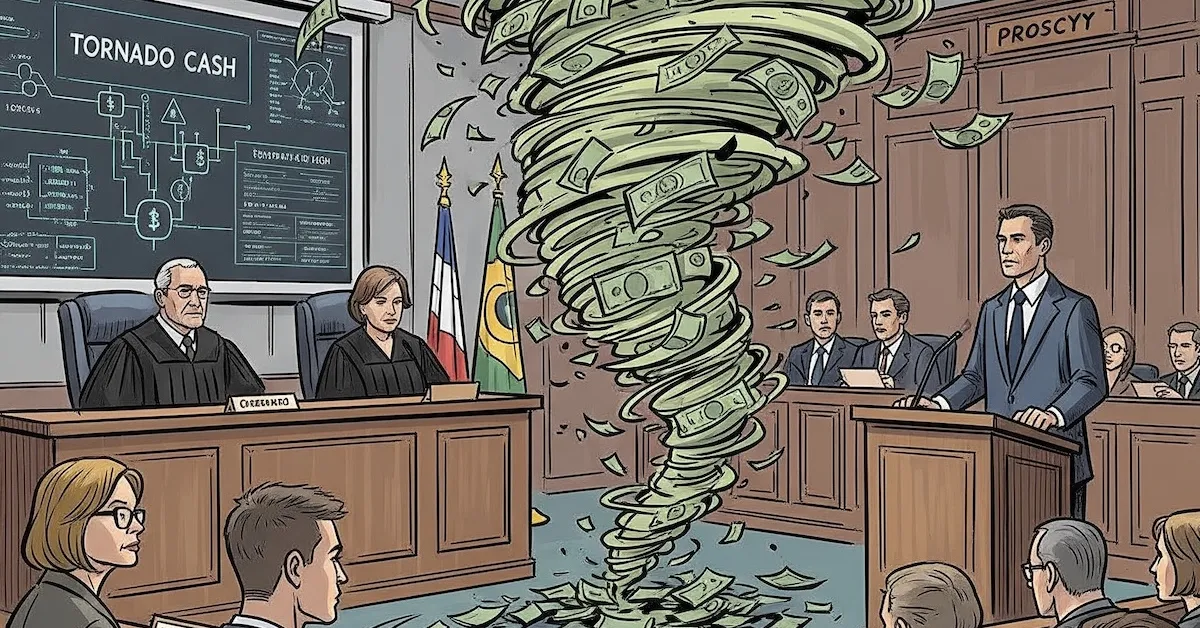Crypto Dev Convicted: Roman Storm Found Guilty in Landmark Tornado Cash Trial

The Tornado Cash trial, a high-stakes legal battle, has brought significant attention to its implications for developers of noncustodial Bitcoin and crypto technology, as well as privacy-preserving software. Amanda Tuminelli, executive director and chief legal officer for the DeFi Education Fund, a body that considers Bitcoin within the scope of DeFi, has been a vocal expert on the matter. Tuminelli provided crucial insights into the three charges leveled against Tornado Cash co-founder Roman Storm, with a particular focus on the conspiracy to operate an unlicensed money transmitting business charge. Her expertise extends to 18 U.S. Code § 1960, the U.S. federal law prohibiting the operation of a money transmitting business without a proper license. Tuminelli asserted that Storm had not violated this statute in his role of creating and operating Tornado Cash, a crypto mixing service built on Ethereum.
The broader legal landscape for crypto developers was also a key point of discussion during her interview, with Tuminelli highlighting the importance of legislation like the CLARITY Act and the Blockchain Regulatory Certainty Act (BRCA). These bills contain specific language designed to protect developers of “non-controlling,” or noncustodial, crypto technology, stipulating that such developers and purveyors should not require a money transmitting license nor be subject to existing money transmission laws. Furthermore, Tuminelli expressed concerns over the Department of Justice’s (DoJ) perceived shift away from 2019 FinCEN guidance, arguing that this departure threatens innovation within the crypto space and could lead to continued prosecution of developers like Storm, despite previous statements from U.S. Deputy Attorney General Todd Blanche indicating the DoJ would stop targeting crypto entities, including mixing and tumbling services, for the acts of their end users. Tuminelli also shared her thoughts on the trial's progression and the defense's strategy, alongside the DeFi Education Fund's submitted amicus briefs for both the Tornado Cash and Samourai Wallet cases, though the former's brief was rejected.
In a pivotal development, Roman Storm was found guilty today in the Southern District of New York (SDNY) on the second count of his indictment: conspiracy to operate an unlicensed money transmitting business. This verdict marks the conclusion of the Tornado Cash trial. While the jury reached a guilty verdict on this specific charge after three and a half days of deliberation, they did not come to a unanimous verdict on the other two counts, which included conspiracy to commit money laundering and conspiracy to violate sanctions. As a consequence of this conviction, Storm now faces a potential sentence of up to five years in prison.
Following the issuance of the verdict, the prosecution made a motion to remand Storm into custody, arguing he posed a flight risk. However, Judge Failla rejected this motion. The defense, led by Ms. Klein, countered the prosecution's assertion by emphasizing Storm's strong ties to the United States, including his Washington state home being tied to a $2 million bail bond, his partial custody of his daughter, the presence of his girlfriend and green card holder parents in the U.S., and the significant support from the U.S.-based crypto community, which is expected to continue during his appeal. Judge Failla acknowledged that Storm's “incentives have shifted tremendously” but stated that the “stability of the verdict is still in play,” likely referring to the impending appeal, before denying the motion to remand him.
Shortly after the verdict, U.S. Attorney for the SDNY, Jay Clayton, who is also a former U.S. Securities and Exchange Commission chair, issued a statement. Clayton asserted that “Roman Storm and Tornado Cash provided a service for North Korean hackers and other criminals to move and hide more than $1 billion of dirty money.” He stressed that while the “speed, efficiency, and functionality of stablecoins and other digital assets offer great promise,” this promise “cannot be an excuse for criminality,” and vowed that his office and partner agencies would hold accountable those who exploit emerging technologies for crime. Notably, Clayton's statement made no mention of the April memo issued by U.S. Deputy Attorney General Todd Blanche, which had indicated that the DoJ would “stop participating in regulation by prosecution” in the crypto space and no longer target virtual currency mixing services for the actions of their end users. Furthermore, Clayton did not acknowledge that the vast majority of funds transacted through Tornado Cash users were not proven to have been obtained illicitly. This outcome and its implications for noncustodial crypto technology and privacy software remain a critical topic for the future of decentralized finance.
You may also like...
NBA Commissioner Silver Sounds Alarm: Calls for More Betting Regulation

NBA Commissioner Adam Silver is calling for stricter regulation in the rapidly expanding U.S. sports betting market to c...
WNBA Stars Set for Salary Surge, Commissioner Silver Confirms

WNBA and WNBPA are in tense negotiations over a new collective bargaining agreement, focusing on player salaries and rev...
Streaming Shocker: Netflix Earnings Stumble on Brazilian Tax Dispute Despite Revenue Surge

Netflix announced its Q3 2025 earnings, revealing an EPS miss due to a Brazilian tax dispute but revenue in line with ex...
Beyond the Grave: Suzanne Somers Returns as AI Clone, Sparking Debate on Digital Immortality

Alan Hamel, widower of the late Suzanne Somers, has announced the creation of an AI clone of his wife for fan interactio...
Kid Cudi's 'Maui Wowie' Makes Shocking Hot 100 Debut After 17 Years!

Kid Cudi's 2008 hit 'Maui Wowie' has surged onto the Billboard Hot 100 at No. 71, seventeen years after its release, tha...
Kenny Chesney Electrifies Vegas with Second Sphere Residency Encore

Country music icon Kenny Chesney is set to return to Las Vegas's Sphere in June 2026 for five new immersive concerts, fo...
Deadly Clashes Rock Ethiopia's Amhara Region: Urgent Travel Safety Alert

Ethiopia's National Defense Forces claim to have killed 48 and wounded 40 Fano fighters in recent counterinsurgency oper...
Muscle Up Fast: The Underrated Skill You NEED for Strength Gains!

Fitness editor Cori Ritchey explores the crucial concept of mind-muscle connection, defining it as the ability to consci...



